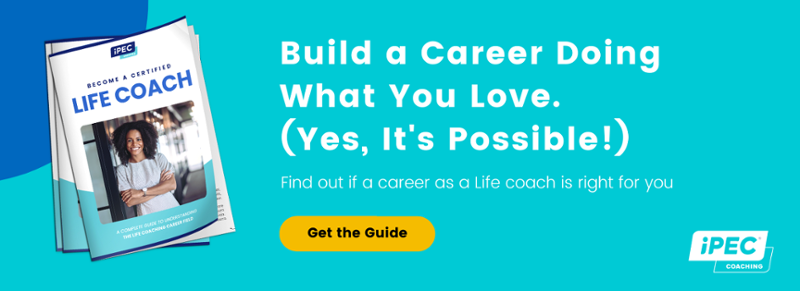5 Ways Fear-Based Thinking is Holding You Back
by Luke Iorio, MCC, CPC, ELI-MP, iPEC Board Member
Nov 17, 2020 | 4 minutes read
What fears hold you back from starting the coaching business that you dream of?
Fear can manifest itself in different ways. It can come out in the form of restless nights, feeling moody, or failing to express pent-up emotions.
The list of ways is kind of endless, depending on the person or situation. Regardless of how fear-based thinking may show up in your life, experiencing it is perfectly normal and somewhat expected. Personally, I’ve found in the past that when the fear gets quiet, it’s time to expand my goals and dreams again.
Being aware of the many ways that fear can conceal itself is the first step to getting unstuck from a situation that’s unfavorable or uncomfortable.
From there, you can make a plan to shift perspectives, refocus, prepare, and move forward.
It can be helpful to think of fear wearing different masks. It’s tricky. It hides. So, spot the masks and you may be able to pinpoint how your fear is showing up today and address it.
Let’s look at five common examples of how fear might show up for you.
1. Piece de Resistance
Ok, so the most important or remarkable feature, is in fact, “resistance” itself!
Resistance is one of fear’s sneaky faces. It comes up as you want to defend your direction or your way of doing or seeing things. It convinces you to hold fast to what’s in your mind. And before you know it, this kind of fear is preventing you from being open to other possibilities, and even keeping you and your life stagnant. Resistance convinces you to not listen to ideas from others. It tells you not to accept help; you’ve got this on your own. It loves to fill you with “I’ll-prove-myself-and-my-view-right” kind of energy.
Resistance is the invisible force field around our status quo. It pulls everything back into keeping things as they are. And when you get to the periphery of the status quo, the resistance will get greater and greater…until your breakthrough to the other side.
Just remember, fear hates change, and resistance is one of its greatest tools.
2. Perfectionism
Perfectionism will always have you wait longer to make a positive change, and it does that by finding flaws with whatever you do or see. Seeking perfection makes it okay in our minds not to make a move or change because we want everything to be ideal before we do it. But, we just never quite get there.
Many times we try to perfect whatever it is that we’re working on—such as career training or preparing to be in a relationship—before we take a leap. That is really just our excuse for holding on longer because we don’t want to be judged or we’re afraid of the unknown. This happens with many people who write books, for example. They hone their craft and spend years refining it, but refuse to send it out to a publisher for consideration thinking that it’s not perfect, so it can’t be enough.
3. Waiting for When
“I’ll do it when…” is a common justification that many of us have for not moving forward. This is similar to waiting for when conditions are “perfect.” It is, however, a different mask that we wear.
We believe we can time things so they are more comfortable—maybe the best time to begin hiking isn’t in the midst of a sub-zero winter. Maybe I’ll start that new training or degree I want when I have more time on my schedule. Maybe I’ll start the new nutrition and exercise plan when the holidays or the summer is over. And then when the time comes, we have a new “when this” or “when that” coming up once again.
How familiar are some of these phrases to you? Probably a bit as nearly everyone has gone through this at some point in their life.
You may want to assess if you’re using timing as an excuse. Make sure the feeling that “the timing isn’t right” isn’t actually fear hiding underneath. It just might be—as I told you, fear is sneaky like that.
Which brings us to…
4. The Well Thought Out Rationalization
Fear is one of the greatest litigators to ever walk into a courtroom. It loves a good rationalization that justifies your thinking and actions (or lack thereof), while simultaneously hiding and distracting you from those pesky emotions that are trying to shout, “NO, NO don’t believe him! Look here, feel here!”
It works like this.
You find yourself in a situation you’re not comfortable or happy with; however, the “pain” you’re in now is significantly less troublesome than the dreaded unknown (we’ll discuss that one next!).
Let’s say you find yourself in a job or career that isn’t fulfilling to you—it’s either not what you thought it would be or you have other values, interests, and strengths that aren’t being tapped. You feel a pull to make a change, and then the fear center of your brain kicks in and says, “WAIT!”
- You’re risking your nice, steady income.
- You’re risking stability.
- What if you don’t find another job or you start a new business and it takes a really long time to make the money you need?
And now queue the rationalization. It may sound like, “You know this job—or organization—really isn’t all that bad. It provides for you. You save a little money. And everyone has stress, right? Sure, everyone has those times that they question themselves but that’s normal. You don’t need to act on that. Just look to the other people you know that are unhappy with their job or company or career and stay put…”
It quite literally put you in your place. And that’s the job of rationalization: to lessen the pain or the discomfort so you can cope with it. While that, at times, can undoubtedly be used to great effect and benefit, when it lingers, it ensnares you into the status quo and a life of “good enough.”
5. The Perceived Void
We like certainty—actually we love it! We really like knowing what’s coming up. We like to know what we can rely on.
But the void we see in front of us is uncertainty. Uncertainty often keeps our sights set on external factors that are too numerous or too unclear for us to feel comfortable. That, in turn, lets our minds run rampant with every story we can create as to what might happen, which builds anxiety about the outcomes.
This could be the case if you’re in a romantic relationship that you know is not working, but you don’t break up with the other person. You’re just not sure if there’s anyone better out there or that you can find that someone who’s a better fit, so you may as well just stay put.
Whether in relationships, careers, or business, it’s just like Mark Twain said,
“I am an old man and have known a great many troubles, but most of them never happened.”
Beware of filling in the void of uncertainty with stories, worries, and anxieties. Most of them will never happen. So consider, what facet of life are you stuck in? Which mindset of fear may be making an appearance?
Now you can call it out and find perspective with fresh eyes that’ll lead you forward.
Curious About a Career as a Professional Coach?
Check out our in-depth guide to the field of coaching, and explore whether it's the right match for your unique gifts and goals!


